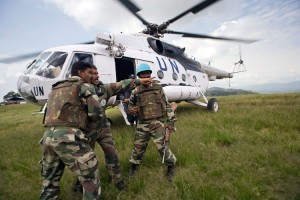Raising the issue of safety of troops deployed in UN operations, India has underlined that careful planning and consultations between the Security Council and the troop-contributing countries while formulating the mandates “will go a long way in promoting safety and security of our peacekeepers”. India’s Permanent Representative to the UN, Syed Akbaruddin, was speaking before the special committee for Peacekeeping Operations (PKO) where he said that the UN peacekeepers were facing new challenges such as terrorism and intra-ethnic conflicts. He stressed on the need to reinvent themselves with new tools to tackle these challenges.
Mr Akbaruddin said that India wanted to “strongly emphasise” that all the countries where peacekeepers are deployed “must ensure that in cases of attacks on the peacekeepers there is an effective process to prosecute, punish and penalise the perpetrators”.
Reiterating India’s demand for a consultative process in peacekeeping, Mr Akbaruddin said that countries that contribute to peacekeeping should be consulted as stated in the UN Charter. He also suggested broadening it. “In an inter-connected world, it is very easy for member states to be at the receiving end or at times suffer collateral damage if they are in the vicinity of areas which are unstable and prone to conflicts,” Mr Akbaruddin added.
Speaking about the recommendation made by a high level panel last year against the deploying peacekeepers in counter-terrorism operations, Mr Akbaruddin said that India supported the recommendation. Focusing on the role India has played in peacekeeping, Mr Akbaruddin said: “As a country which has participated in 48 UN peacekeeping operations, we have contributed our share to the maintenance of international peace and security with high standards of professionalism that are troops are known for.” India has made the largest contribution to peacekeeping missions with more than 180,000 personnel since inception of the UN missions. At present there are close to 8,000 Indian troops involved in various peacekeeping missions.
During his address to the UN in September 2015, Prime Minister Narendra Modi had made a few suggestions on reforming peacekeeping operations and spoke about the larger role India would play.
“We have a zero tolerance policy on SEA cases and would like that there is zero tolerance on such issues across the UN too,” Mr Akbaruddin said. He added that India is appalled by the recent cases of sexual exploitation and abuse which have surfaced in some of the UNPKOs. “My delegation strongly condemns these unpardonable acts when the protector becomes the perpetrator,” he said.
Author Profile
- India Writes Network (www.indiawrites.org) is an emerging think tank and a media-publishing company focused on international affairs & the India Story. Centre for Global India Insights is the research arm of India Writes Network. To subscribe to India and the World, write to editor@indiawrites.org. A venture of TGII Media Private Limited, a leading media, publishing and consultancy company, IWN has carved a niche for balanced and exhaustive reporting and analysis of international affairs. Eminent personalities, politicians, diplomats, authors, strategy gurus and news-makers have contributed to India Writes Network, as also “India and the World,” a magazine focused on global affairs.
Latest entries
 DiplomacyJanuary 5, 2026India walks diplomatic tightrope over US operation in Venezuela
DiplomacyJanuary 5, 2026India walks diplomatic tightrope over US operation in Venezuela India and the WorldNovember 26, 2025G20@20: Africa’s Moment – The Once and Future World Order
India and the WorldNovember 26, 2025G20@20: Africa’s Moment – The Once and Future World Order DiplomacyOctober 4, 2025UNGA Resolution 2758 Must Not Be Distorted, One-China Principle Brooks No Challenge
DiplomacyOctober 4, 2025UNGA Resolution 2758 Must Not Be Distorted, One-China Principle Brooks No Challenge India and the WorldJuly 26, 2025MPs, diplomats laud Operation Sindoor, call for national unity to combat Pakistan-sponsored terror
India and the WorldJuly 26, 2025MPs, diplomats laud Operation Sindoor, call for national unity to combat Pakistan-sponsored terror








